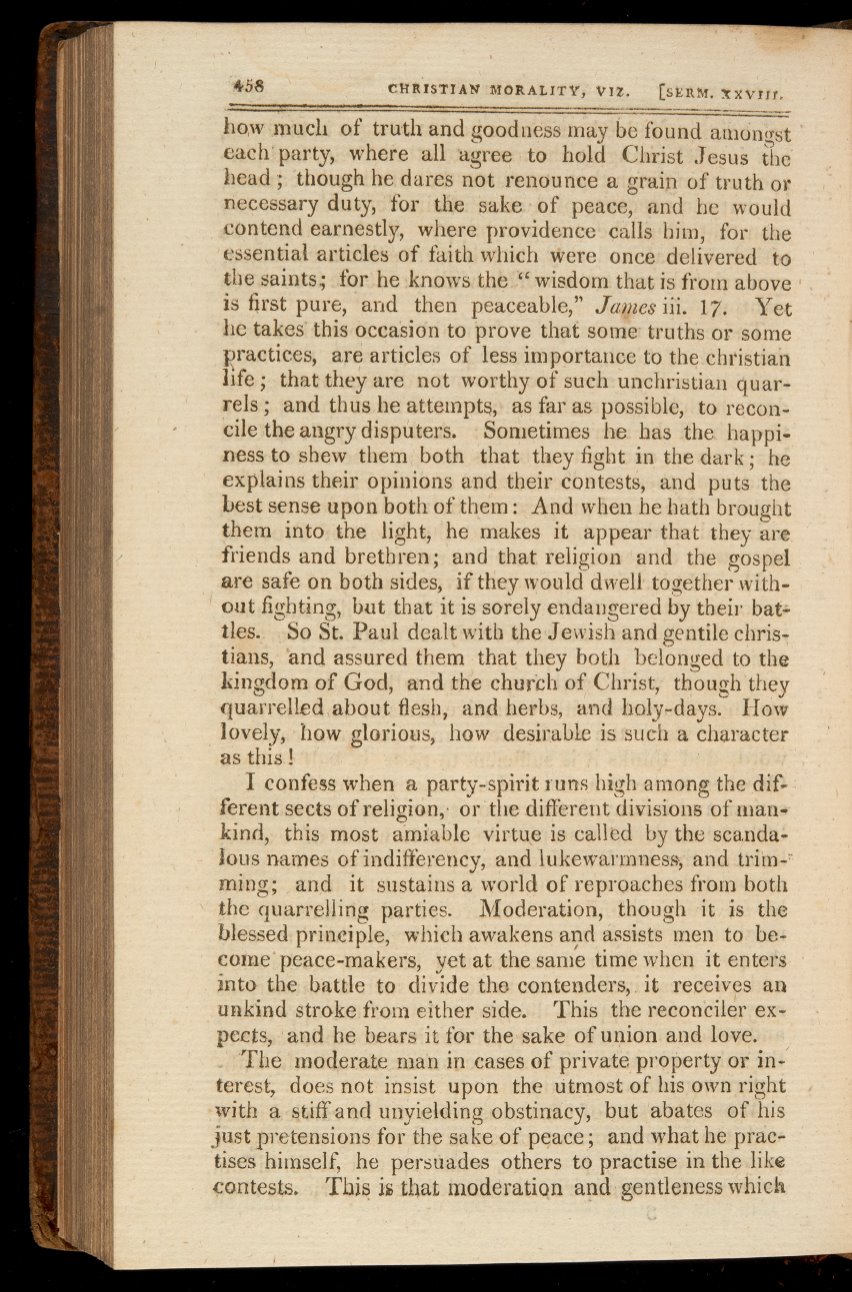

468
CHRISTIAN MORALITY, VIZ.
[SÉRM.
SXVIII,
how much
of
truth
and goodness
may
be
found atnengst
each'
party, where all
agree to
hold
Christ Jesus the
head
;
though
he
dares not renounce a
grain
of
truth
or
necessary
duty, for
the sake
of
peace, and
he would
contend
earnestly, where
providence
calls
him,
for the
essential articles
of
faith
which were once
delivered to
the saints; for
he knows
the
"
wisdom
that
is
from above
is
first
pure, and then
peaceable,"
James
iii.
17.
Yet
he
takes
this occasion to
prove
that
some truths or
some
practices, are articles
of
less
importance
to the
christian
life
;
that
they
are not worthy
of
such
unchristian
quar-
rels;
and thus
he
attempts,
as
far
as
possible,
to
recon-
cile
the angry disputers.
Sometimes he has the
happi-
ness
to shew
them both
that
they
fight
in
the
dark
;
he
explains
their
opinions and their
contests, and puts the
best
sense
upon both
of
them
:
And when he bath brought
them into
the
light, he makes
it
appear that
they
are
friends and
brethren;
and
that
religion and
the gospel
are
safe
on both
sides,
if
they
would dwell
together
with-
out
fighting,
but that it
is
sorely
endangered
by
their
bat=
ties.
So St.
Paul
dealt
with
the
Jewish
and gentile chris-
Cans,
and
assured
them
that
they both belonged
to
the
kingdom
of
God, and the church
of
Christ, though they
quarrelled,
about
flesh,
and
herbs,
and
holy-days.
How
lovely, bow glorious,
how
desirable
is such
a
character
as
this
!
I
confess when
a
party
-
spirit runs
high among
the
dif-
ferent
sects
of
religion, or the
different
divisions
of
man-
kind,
this
most amiable virtue
is
called
by
the scanda-
lous names
of
indifferency,
and
lukewarxnness,
and
trim
ming; and
it
sustains a world
of
reproaches
from
both
the quarrelling parties. Moderation, though it
is
the
blessed
principle,
which
awakens
and
assists men to
be-
come peace-makers, yet
at
the
same time when
it
enters
into
the
battle
to divide
the contenders,
.
it
receives
an
unkind stroke
from
either
side.
This
the reconciler ex-
pects,
and
he
bears
it
for the sake
of
union and
love.
The
moderate
man in cases
of private property
or in-
terest, does
not
insist
upon the utmost of
his own
right
with
a stiff and unyielding obstinacy,
but
abates
of
his
just
pretensions
for the sake
of
peace
;
and what
he
prac-
tises
himself,
he
persuades others to practise
in the
like
çontests. This
is
that
moderatión and
gentleness
which

















